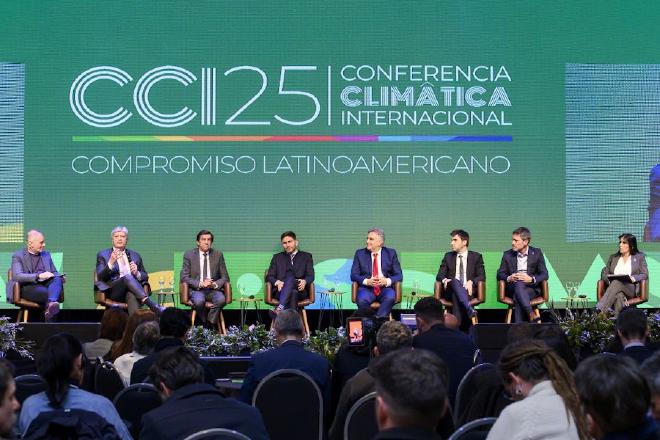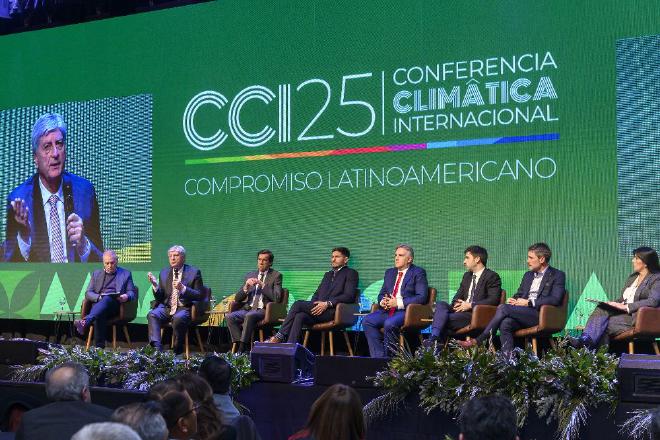

The Governor of La Pampa, Sergio Ziliotto, participated this Tuesday in the city of Córdoba in the first International Climate Conference “Latin American Commitment towards COP 30” and the 5th World Summit on the Circular Economy. These two events reunited more than 150 international and national leaders in environmental policies, representing more than 25 international organizations, state agencies, universities, and embassies, among other stakeholders committed to addressing the challenges posed by climate change.
Within the framework of the Federal Political Dialogue, Ziliotto shared a panel with the host, Martín Llaryora (Córdoba), and the governors Carlos Sadir (Jujuy), Ignacio Torres (Chubut), Maximiliano Pullaro (Santa Fe), and Vice Governor Alicia Aluani (Entre Ríos_). The Secretary General of the Federal Investment Council, Ignacio Lamothe, also participated.
During his presentation, he urged people to leave behind sterile divisions and build a forward-looking environmental policy: “Just as we must overcome partisan divides, we must also eliminate the gap between the state and the market, between the public and the private sector. But above all, we must take charge of eliminating the gap between production and the environment. We must seek a sustainable balance to generate development.”
The La Pampa governor asserted that his province upholds environmental protection as a state policy and affirmed that “taking charge” means giving the issue institutional status: “Since the first days of this administration, the environmental area has had ministerial rank. We were not elected to impose anything, but to seek the common good. And that common good is built by everyone.”

Ziliotto emphasized that 80% of the native forest in La Pampa remains standing and serving production, and called for “recognition for those who do things well.” “The threat of sanctions from the European Union does not recognize the good environmental practices of our provinces. In La Pampa, the prestige of our meats is not unfounded: we win over diverse markets by doing things right,” he stated.
In his message, he also praised the role of municipal governments in developing tangible environmental policies: “They are the first line of defense in social, economic, and environmental matters. And they must be an active part of this collective construction.”
Finally, he said that “the enormous challenge, as always, is to take charge. Understanding that this is a common cause, requiring the collective work of everyone, and taking into account the enormous legacy that we may not see, but that future generations will be able to enjoy. That will have meant meeting the enormous challenge we face and that we are taking on today, surely among seven provinces, but many more from now on, with many municipal governments, to, as I say, live up to that need to take charge. To take charge of protecting the environment, and to take charge of seeking the best response to this climate change.”
Latin American Commitment #
Following the discussion, the provinces of Córdoba, La Pampa, Santa Fe, Entre Ríos, Jujuy, and Chubut -all of them from Argentina- signed the “Latin American Commitment to COP 30,” a document that positions the voice of subnational governments on the global climate agenda.
The declaration reaffirms that climate action must promote sovereignty over natural resources, social justice, and development with territorial equity, and calls for leaving no people behind in the transition.
Its commitments include:
-
Strengthening multi-level governance;
-
Demanding climate financing for Latin America;
-
Protecting biodiversity and promoting ecosystem adaptation;
-
Accelerating the transition to a circular economy;
-
Investing in a fair and equitable energy transition;
-
Incorporating gender and diversity perspectives into climate policies.
With this participation, La Pampa joined the goal of ensuring that the voices of the Argentine and Latin American states be heard strongly at the next United Nations Climate Change Conference, to be held in November 2025 in Belém do Pará, Brazil.

